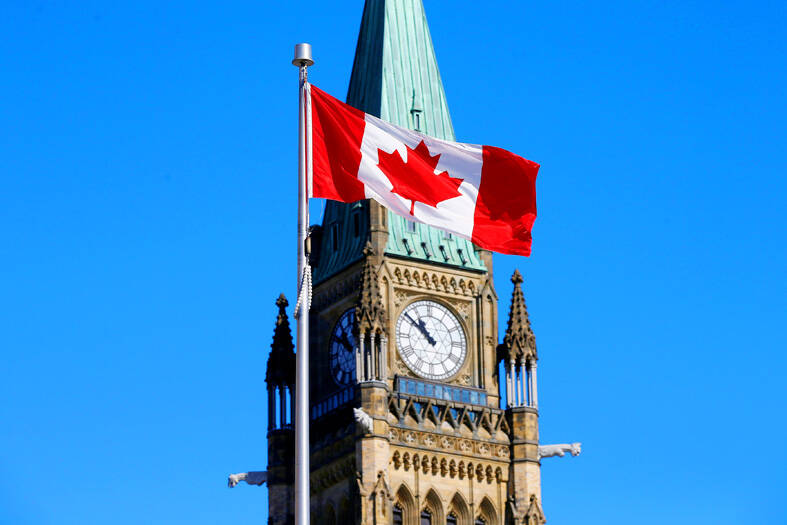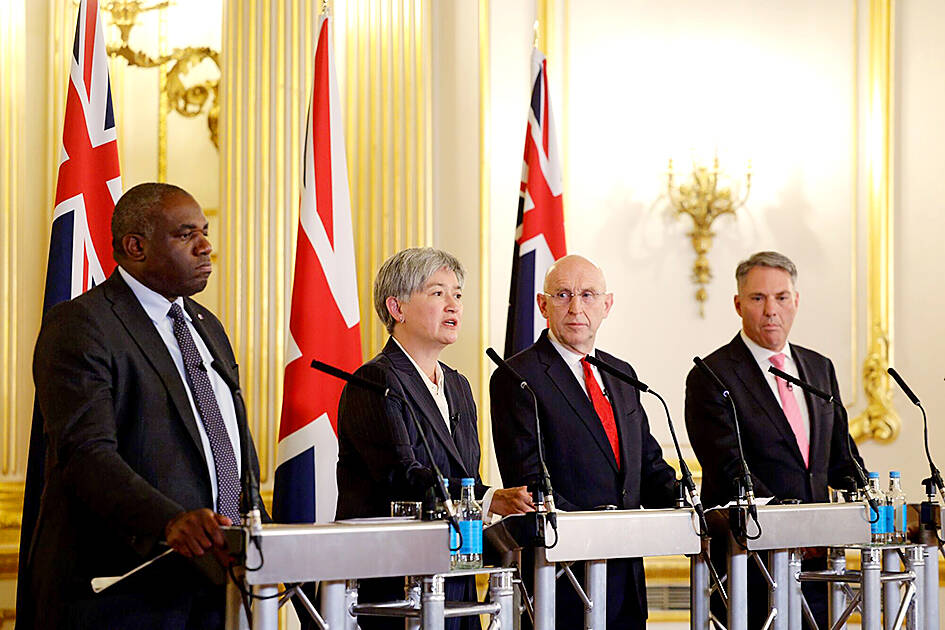Canada should support the peaceful resolution of Taiwan’s destiny according to the will of Taiwanese, Canadian lawmakers said in a resolution marking the second anniversary of that nation’s Indo-Pacific strategy on Monday.
The Canadian House of Commons committee on Canada-Chinese relations made the comment as part of 34 recommendations for the new edition of the strategy, adding that Ottawa should back Taiwan’s meaningful participation in international organizations.
Canada’s Indo-Pacific Strategy, first published in October 2022, emphasized that the region’s security, trade, human rights, democracy and environmental protection would play a crucial role in shaping Canada’s future.

Photo: Reuters
The strategy called for Canada to deepen its ties with Taiwan and other regional partners sharing democratic values, and oppose any unilateral attempt to change the status quo in the Taiwan Strait.
Ottawa should improve Taiwan’s resilience, trade ties and cooperation between the two nations’ peoples by strengthening bilateral collaboration in economics, technology, supply chains, public health, democratic governance and countering disinformation, it said.
The Canadian House of Commons Special Committee on the Canada-People’s Republic of China Relationship — whose members include lawmakers from across the political divide — was created in December 2019 to review all aspects governing the two nations’ relations.

Photo: Bloomberg
Ottawa’s China policy represents substantial differences from Beijing’s “one China principle,” the special committee said in a report entitled “Canada and Taiwan: A Strong Relationship in Turbulent Times.”
The Canadian Indo-Pacific Strategy should govern the nation’s relationship with Taiwan, it added.
Representative to Canada Harry Tseng (曾厚仁) hailed the report as the most important development in bilateral relations since Ottawa switched diplomatic recognition from Taiwan to China.
The special committee’s report last year already included a series of recommendations to improve collaboration on issues concerning diplomacy, security, trade, technology and affairs affecting indigenous people.
The previous report underscored the instability in the cross-strait security situation and the importance of enhancing Taiwan-Canada relations to counter China’s growing threat toward Taiwan.
Meanwhile, a statement issued after a meeting between the British foreign secretary and defence secretary and the Australian foreign minister and defence minister on Monday reiterated support for Taiwan’s international participation and opposition to unilateral change in the Taiwan Strait.
“Ministers underscored the critical importance of peace and stability across the Taiwan Strait. They emphasised that differences should be resolved peacefully and not through the threat or use of force or coercion; and reaffirmed their shared opposition to unilateral changes to the status quo,” it said. “They recognised that the international community benefits from the expertise of the people of Taiwan and committed to working together to support Taiwan’s meaningful participation in international organisations, as a member where statehood is not a prerequisite or as an observer or guest where it is.”
In Taipei, the Ministry of Foreign Affairs said it “applauds and welcomes” the UK’s and Australia’s support for Taiwan, adding that they share Taiwan’s belief in the universal values of freedom, democracy and the rule of law, and that they are a force for peace in the Indo-Pacific region.
Taiwan is an indispensable member of the international community and would continue to cooperate closely with like-minded nations to maintain peace and stability across the Taiwan Strait, participate in international organizations, defend the rules-based international order and contribute to peace and stability in the region, it said.
Additional reporting by Huang Ching-hsuan

CHAOS: Iranians took to the streets playing celebratory music after reports of Khamenei’s death on Saturday, while mourners also gathered in Tehran yesterday Iranian Supreme Leader Ayatollah Ali Khamenei was killed in a major attack on Iran launched by Israel and the US, throwing the future of the Islamic republic into doubt and raising the risk of regional instability. Iranian state television and the state-run IRNA news agency announced the 86-year-old’s death early yesterday. US President Donald Trump said it gave Iranians their “greatest chance” to “take back” their country. The announcements came after a joint US and Israeli aerial bombardment that targeted Iranian military and governmental sites. Trump said the “heavy and pinpoint bombing” would continue through the week or as long

TRUST: The KMT said it respected the US’ timing and considerations, and hoped it would continue to honor its commitments to helping Taiwan bolster its defenses and deterrence US President Donald Trump is delaying a multibillion-dollar arms sale to Taiwan to ensure his visit to Beijing is successful, a New York Times report said. The weapons sales package has stalled in the US Department of State, the report said, citing US officials it did not identify. The White House has told agencies not to push forward ahead of Trump’s meeting with Chinese President Xi Jinping (習近平), it said. The two last month held a phone call to discuss trade and geopolitical flashpoints ahead of the summit. Xi raised the Taiwan issue and urged the US to handle arms sales to

BIG SPENDERS: Foreign investors bought the most Taiwan equities since 2005, signaling confidence that an AI boom would continue to benefit chipmakers Taiwan Semiconductor Manufacturing Co’s (TSMC, 台積電) market capitalization swelled to US$2 trillion for the first time following a 4.25 percent rally in its American depositary receipts (ADR) overnight, putting the world’s biggest contract chipmaker sixth on the list of the world’s biggest companies by market capitalization, just behind Amazon.com Inc. The site CompaniesMarketcap.com ranked TSMC ahead of Saudi Aramco and Meta Platforms Inc. The Taiwanese company’s ADRs on Tuesday surged to US$385.75 on the New York Stock Exchange, as strong demand for artificial intelligence (AI) applications led to chip supply constraints and boost revenue growth to record-breaking levels. Each TSMC ADR represents

Pro-democracy media tycoon Jimmy Lai’s (黎智英) fraud conviction and prison sentence were yesterday overturned by a Hong Kong court, in a surprise legal decision that comes soon after Lai was jailed for 20 years on a separate national security charge. Judges Jeremy Poon (潘兆初), Anthea Pang (彭寶琴) and Derek Pang (彭偉昌) said in the judgement that they allowed the appeal from Lai, and another defendant in the case, to proceed, as a lower court judge had “erred.” “The Court of Appeal gave them leave to appeal against their conviction, allowed their appeals, quashed the convictions and set aside the sentences,” the judges